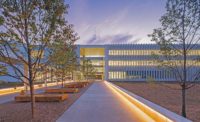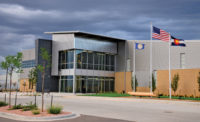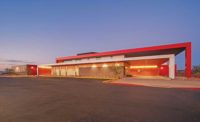RTC Mobility Training Center
Las Vegas
Best Project
Owner/Developer Regional Transportation Commission of Southern Nevada
General Contractor Sletten Construction
Lead Design Firm Gensler
Electrical Helix Electric
Structural Engineer The Louis Berger Group
Civil Engineer The Louis Berger Group
MEP Engineer Henderson Engineers
Landscape Architect Southwick Landscape
Subcontractors Anne Johnson; Rolf Jensen & Associates/Jensen Hughes; O’Connor Construction Management.
The 14,700-sq-ft RTC Mobility Training Center in Las Vegas was created to help southern Nevadans—particularly senior citizens and persons with disabilities—increase mobility.
The center adds to the existing RTC Sunset Maintenance facility. It houses two working buses situated on a simulated streetscape featuring a bus shelter/bus stop, paved roads, ADA ramps, a sidewalk, simulated apartment area and a course with various surface and terrain obstacles.
Challenges for the project team included using imitation asphalt, recreating outdoor views and installing varying floor materials. To create the buses used for training, the engines, transmissions and gas tanks were removed, while internal power was used to operate the systems, including a paratransit ramp.
Architectural inspiration comes from nearby Red Rock Canyon, famed for its red and orange mountain ranges. An angled ground treatment extends from the parking area and progressively narrows as it reaches the entry point, creating a funneling effect into the “canyon.”
“By introducing a series of secondary architectural enhancements to this ‘canyon’ volume, we were able to enhance the focus on the entry,” says Jay Silverberg, design director with Gensler.
To overcome plan and schedule changes, the project team added walls and doors to enclose the overflow workspace cubicles, integrated an audio system to the certification training area and installed an enhanced crosswalk system coordinated with indoor traffic lights. Existing doors with automatic openers were also installed.
There were zero OSHA recordable incidents, and worker hours reached more than 4,000.







Post a comment to this article
Report Abusive Comment